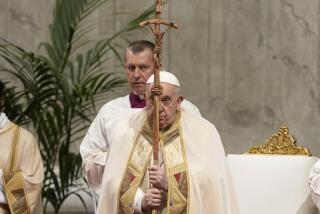Peres and Pope Cordially Disagree on Mideast Peace
- Share via
VATICAN CITY — Israeli Prime Minister Shimon Peres and Pope John Paul II disagreed in a meeting here Tuesday on key steps toward Middle East peace but parted cordially, in contrast to the last meeting between a Pope and an Israeli head of government 12 years ago.
In a 40-minute private meeting with Peres, the pontiff, according to a Vatican spokesman, did not budge from his position of last April. Then--in addition to backing security for Israel--he called for a Palestinian homeland and an “internationally guaranteed” status for Jerusalem.
“I told His Holiness that Jerusalem remains the unified capital of Israel,” Peres reported to journalists after the papal audience.
“It was clear in our discussion that we must distinguish between the religious and the political parts of the question of Jerusalem,” he said. “Our government respects the religious rights, needs and expectations of all religions.”
Although the Vatican had indicated that it would make no public comment after the meeting, the senior Vatican spokesman, Joaquin Navarro, reacted to Peres’ remarks by reminding reporters that the position of the Holy See remains unchanged. Implying continued disagreement between the pontiff and the Israeli government, Navarro chose a diplomatically low-key phrase and characterized the respective positions as “not identical.” He said the meeting was “cordial.”
The last Israeli prime minister to meet a Pope was the late Golda Meir, who visited Pope Paul VI in 1973. During her audience, the Vatican issued a statement in support of Arab nations in conflict with Israel, and Meir reacted angrily.
Pope’s Talk With Arafat
Vatican-Israeli relations have been relatively smooth recently after a low point in 1982, when John Paul received Palestine Liberation Organization Chairman Yasser Arafat in a private audience here, arousing bitter hostility in Israel.
Ironically, a similar dispute with the Italian government led Peres to delay his current trip to Italy, originally scheduled for last month, because Prime Minister Bettino Craxi met with Arafat in Tunisia in December.
Italy, which presently holds the presidency of the European Economic Community, has been pressing its Common Market partners to propose a fresh Middle East peace plan in which the PLO would be “associated” in future negotiations. Israel firmly opposes the proposed European initiative and has consistently said it will refuse to negotiate with the PLO, which does not publicly recognize Israel’s existence.
Issue of Palestinians
The Vatican spelled out its position in an apostolic letter from the Pope last April in which he referred to the Palestinian people’s “natural right, out of justice” to a homeland. Concerning Jerusalem, the pontiff called for “a special, internationally guaranteed statute so that one side or the other cannot place it under discrimination.”
The Israeli Parliament in 1980 declared all of Jerusalem, including Arab East Jerusalem, to be its capital, and Israel has rejected all proposals to internationalize the city.
John Paul also called for “the desired security and just tranquility that is the prerogative of every nation” for Israel.
Although the question of formal diplomatic recognition of Israel by the Holy See had been expected to be raised during the Peres audience, the prime minister said the subject did not come up. Also, Peres said, he did not formally invite the Pope to visit Israel, although he did tell him, “If he is coming our way he will be a welcome guest.”
The Vatican has never officially explained why it refuses to establish diplomatic relations with the Jewish state. Some Vatican sources attribute the rejection to the general state of turmoil in the Middle East, while others suggest that the Holy See fears possible repercussions against Christians in neighboring Arab countries. The Vatican has diplomatic relations with a number of Arab countries including Algeria, Syria, Egypt, Lebanon and Kuwait.
More to Read
Sign up for Essential California
The most important California stories and recommendations in your inbox every morning.
You may occasionally receive promotional content from the Los Angeles Times.













